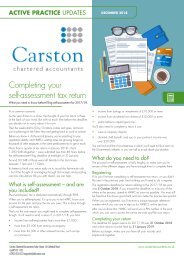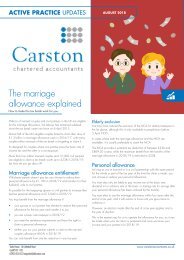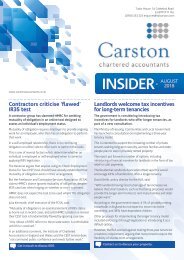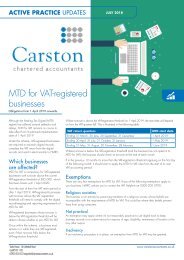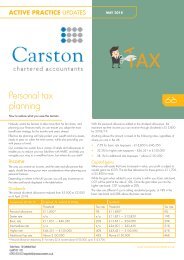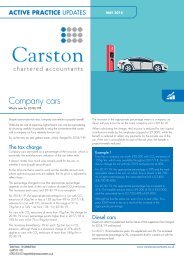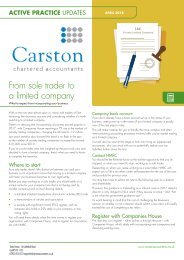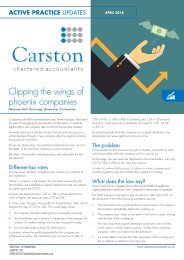Budget Report 2018
Get up to speed with the changes announced in Philip Hammond's Budget with our detailed report.
Get up to speed with the changes announced in Philip Hammond's Budget with our detailed report.
- No tags were found...
You also want an ePaper? Increase the reach of your titles
YUMPU automatically turns print PDFs into web optimized ePapers that Google loves.
12 | VAT<br />
VAT<br />
Registration threshold<br />
frozen until 2022<br />
The VAT-registration threshold was frozen at<br />
£85,000 until 1 April 2020 in the last <strong>Budget</strong>, and the<br />
Chancellor extended that until 1 April 2022.<br />
HMRC had consulted on the VAT-registration<br />
threshold following suggestions from the Ofice of<br />
Tax Simpliication.<br />
It is thought in some quarters that the registration<br />
threshold is a barrier to the growth of business<br />
and so this issue is likely to be revisited in<br />
subsequent <strong>Budget</strong>s.<br />
The Chancellor did state that he would be “looking<br />
at the possibility of introducing a smoothing<br />
mechanism once the terms of the EU exit are clear”.<br />
Until then the current VAT-registration threshold will<br />
remain as follows:<br />
• A business must be VAT-registered when its<br />
taxable turnover in the last 12 months has<br />
exceeded £85,000 or is expected to exceed<br />
£85,000 in the next 30 days alone.<br />
• A business may be able to avoid registration if the<br />
above limit has been exceeded, but it does not<br />
expect to exceed £83,000 in the next 12 months.<br />
• A business may apply for deregistration if it can<br />
satisfy HMRC that its taxable turnover will fall<br />
below £83,000 in the next 12 months.<br />
The construction industry:<br />
reverse charge<br />
The Government is publishing legislation separately<br />
to the <strong>Budget</strong> in respect of the reverse charge that<br />
will come into effect from 1 October 2019.<br />
The recipient of relevant construction services will<br />
be required to account for the VAT on the supply as<br />
a reverse charge.<br />
The aim is to prevent missing trader fraud where<br />
subcontractors abscond with the VAT collected in<br />
respect of works on a building project.<br />
However, this <strong>Budget</strong> will provide for the<br />
introduction of a statutory instrument.<br />
This will enable HMRC to determine that the reverse<br />
charge does not count towards taxable turnover<br />
when an unregistered business considers whether it<br />
has exceeded the VAT-registration threshold.<br />
Vouchers<br />
The UK will implement EU legislation in respect of<br />
the VAT treatment of vouchers.<br />
From 1 January 2019, businesses that sell vouchers<br />
or allow customers to redeem them will need to be<br />
clear as to whether the voucher they sell is a singlepurpose<br />
voucher (SPV) or a multi-purpose voucher<br />
(MPV).<br />
With SPVs, only one rate of VAT applies to the<br />
goods or services which can be bought with it and<br />
where the place of supply is certain.<br />
VAT will need to be accounted for, where applicable,<br />
on the sale of the voucher by the person who sells it<br />
as if it had sold the goods or services in question.<br />
An MPV is where the VAT rate of the goods or<br />
services redeemable is not known. For instance,<br />
where a voucher could be used to buy zero-rated<br />
books or standard-rated DVDs.<br />
Here, the VAT due is only accountable when the<br />
customer redeems the voucher with the retailer<br />
providing the goods.



